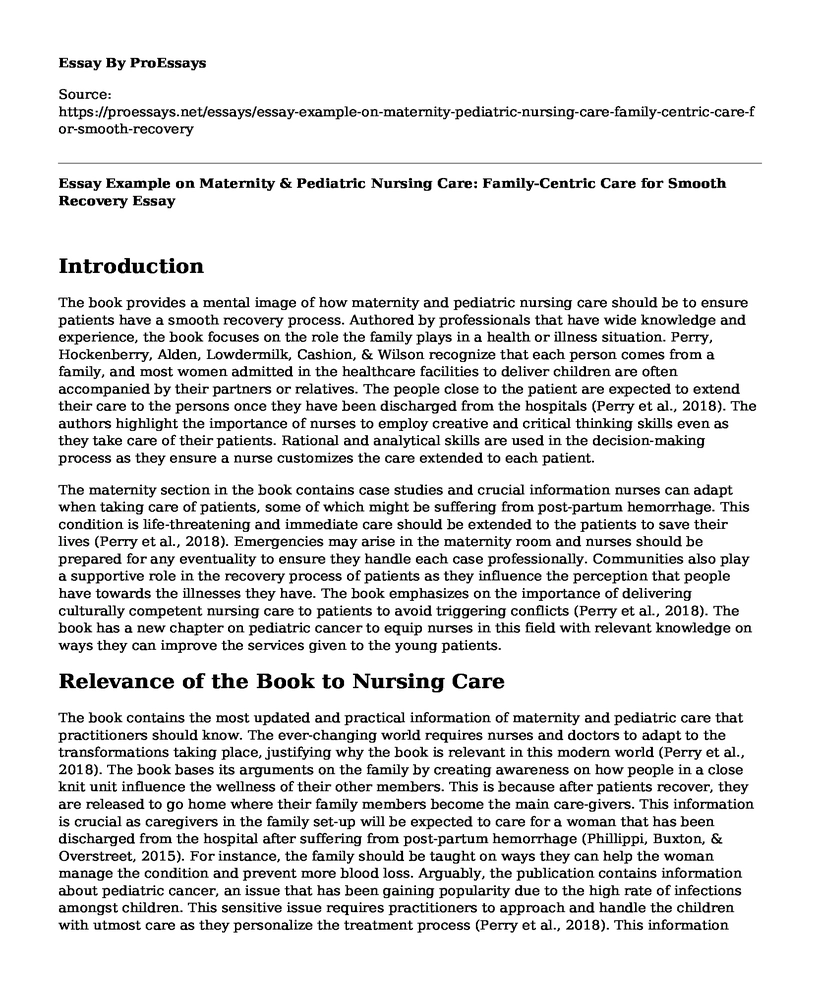Introduction
The book provides a mental image of how maternity and pediatric nursing care should be to ensure patients have a smooth recovery process. Authored by professionals that have wide knowledge and experience, the book focuses on the role the family plays in a health or illness situation. Perry, Hockenberry, Alden, Lowdermilk, Cashion, & Wilson recognize that each person comes from a family, and most women admitted in the healthcare facilities to deliver children are often accompanied by their partners or relatives. The people close to the patient are expected to extend their care to the persons once they have been discharged from the hospitals (Perry et al., 2018). The authors highlight the importance of nurses to employ creative and critical thinking skills even as they take care of their patients. Rational and analytical skills are used in the decision-making process as they ensure a nurse customizes the care extended to each patient.
The maternity section in the book contains case studies and crucial information nurses can adapt when taking care of patients, some of which might be suffering from post-partum hemorrhage. This condition is life-threatening and immediate care should be extended to the patients to save their lives (Perry et al., 2018). Emergencies may arise in the maternity room and nurses should be prepared for any eventuality to ensure they handle each case professionally. Communities also play a supportive role in the recovery process of patients as they influence the perception that people have towards the illnesses they have. The book emphasizes on the importance of delivering culturally competent nursing care to patients to avoid triggering conflicts (Perry et al., 2018). The book has a new chapter on pediatric cancer to equip nurses in this field with relevant knowledge on ways they can improve the services given to the young patients.
Relevance of the Book to Nursing Care
The book contains the most updated and practical information of maternity and pediatric care that practitioners should know. The ever-changing world requires nurses and doctors to adapt to the transformations taking place, justifying why the book is relevant in this modern world (Perry et al., 2018). The book bases its arguments on the family by creating awareness on how people in a close knit unit influence the wellness of their other members. This is because after patients recover, they are released to go home where their family members become the main care-givers. This information is crucial as caregivers in the family set-up will be expected to care for a woman that has been discharged from the hospital after suffering from post-partum hemorrhage (Phillippi, Buxton, & Overstreet, 2015). For instance, the family should be taught on ways they can help the woman manage the condition and prevent more blood loss. Arguably, the publication contains information about pediatric cancer, an issue that has been gaining popularity due to the high rate of infections amongst children. This sensitive issue requires practitioners to approach and handle the children with utmost care as they personalize the treatment process (Perry et al., 2018). This information contained in this chapter can be used in the care of other patients suffering from post-partum hemorrhage as a caregiver only requires personalizing the process.
Justification of Agreeing with Information Provided
I agree with the information provided in the book as it captures the role nursing care plays in the recovery process especially for women suffering from post-partum hemorrhage. One of the lessons I have gained in my personal experiences in taking care of patients suffering from post-partum hemorrhage is that the concepts of sexual abuse and spirituality always conflict. Most women do not want to go home as they fear their partners may not understand the medical issue they have, with some stating that they might be required to fulfill their husbands’ sexual needs. Creating awareness amongst family members on the need to exercise care for the recovering women would make it easy for the patients as they recover at home (Phillippi, Buxton, & Overstreet, 2015). It is also important to educate family members on the need to separate spirituality with post-partum hemorrhage.
References
Perry, S. E., Hockenberry, M. J., Alden, K. R., Lowdermilk, D. L., Cashion, M. C., & Wilson, D. (2018). Maternal Child Nursing Care-E-Book. (6th. ed). Mosby.
Phillippi, J. C., Buxton, M., & Overstreet, M. (2015). Interprofessional simulation of a retained placenta and postpartum hemorrhage. Nurse education in practice, 15(4), 333-338.
Cite this page
Essay Example on Maternity & Pediatric Nursing Care: Family-Centric Care for Smooth Recovery. (2023, Aug 28). Retrieved from https://proessays.net/essays/essay-example-on-maternity-pediatric-nursing-care-family-centric-care-for-smooth-recovery
If you are the original author of this essay and no longer wish to have it published on the ProEssays website, please click below to request its removal:
- Studying the Effects of Energy Drinks
- Thesis Example on Iodine-containing Contrast Drugs
- Understanding Scope of Practice in Relation to Certification and Licensure - Case Study on Nursing
- Article Analysis Essay on Cancer Biology
- Paper Example on Exercise for Health: Benefits of Physical Activity
- DNA Nanobots: A New Hope for Cancer Treatment - Essay Sample
- Essay on Evidence-Based Practice: Communication Strategies for Engaging New Nurses







